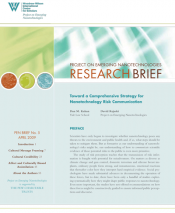Toward a Comprehensive Strategy for Nanotechnology Risk Communication
Cultural Cognition and Nanotechnology Risk Perceptions
Dan M. Kahan, David Rejeski
Over the past two years the Cultural Cognition Project at Yale Law School and the Project on Emerging Nanotechnologies (PEN) examined the cultural bias toward nanotechnology risks. The goals were to understand whether and how cultural bias may affect public opinion toward nanotechnology. This examination could generate insights that could be used to form strategies for communicating scientifically sound information about nanotechnology in forms that make it accessible to citizens of diverse cultural outlooks.
Over the course of three distinct studies, the collaboration sought to explore the following subjects: affect and culturally biased assimilations, cultural credibility, and cultural message framing. All three studies are available together in Toward a Comprehensive Strategy for Nanotechnology Risk Communication.
The latest of this trio of studies, Cultural Cognition and Nanotechnology Risk Perceptions: An Experimental Investigation of Message Framing, asks what science will reveal about the risks and benefits of nanotechnology and what conclusions members of the public will form? It takes an in-depth look at the power of information framing to accentuate or mitigate cultural polarization.
This final report includes a preface by Yale Law School professor Dan Kahan and PEN director David Rejeski, which summarizes the results from the three studies and makes specific policy recommendations based on the researchers’ findings. It also includes the other two (February 2008, March 2007) previously published studies for reference.
April 6, 2009

